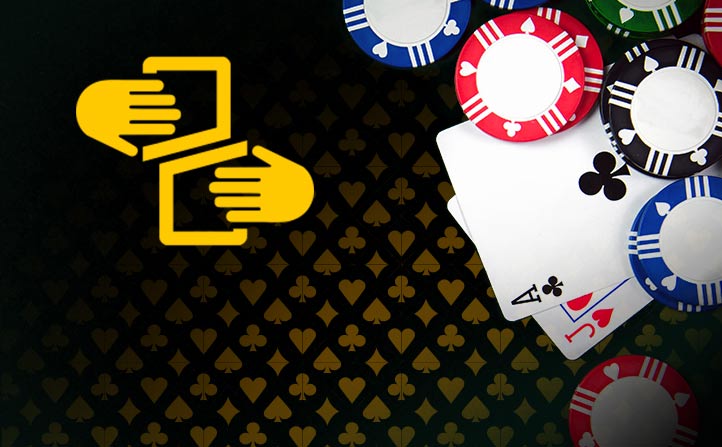 Blackjack rules are simple: obtain a hand with a value of 21, or closest to it, and beat the dealer. Cards two through nine have their face value; 10s, jacks, queens and kings are worth 10 points each, and the ace is worth one or 11 (depending on the point total — this determines if you have a soft hand or a hard hand).
Blackjack rules are simple: obtain a hand with a value of 21, or closest to it, and beat the dealer. Cards two through nine have their face value; 10s, jacks, queens and kings are worth 10 points each, and the ace is worth one or 11 (depending on the point total — this determines if you have a soft hand or a hard hand).
If you wish to play blackjack at an online casino, pair splitting is a potentially game-changing move that is frequently misused.
Unsure how splitting works or whether or not you should split a pair at all? Let’s dig deep and unearth the logic behind pair splitting to help you find out when to split in blackjack.
WHAT DOES SPLIT MEAN IN BLACKJACK?
Splitting involves dividing one hand into two when the dealer hands out a pair (two initial cards of the same value) to the player.
When a player is dealt a pair of cards with the same value, they may have the option to split the pair into two separate hands.
If the player chooses this, an additional bet equal to the original bet must be placed on the newly formed hand.
BLACKJACK SPLITS AND PAIRS
HOW TO SPLIT PAIRS IN BLACKJACK?
Splitting is as straightforward as it sounds! To illustrate how split rules work, let’s say that you placed a €1 wager, and the dealer draws your first two cards: a three of clubs and a three of diamonds, constituting a pair.
If you choose to split, you will have to place a wager with the same amount (€1, in this case) and continue playing with two new hands, each at a value of three with a €1 bet.
You will then play your first hand (on the right) before playing the second hand. You can think of it as playing twice in one round.
WHEN CAN YOU BLACKJACK SPLIT?
Deciding when to split a pair is the tricky part. Splitting in blackjack will depend on many variables: the number of decks used, the game rules, house rules, your initial dealt pairs and the dealer’s upcard.
Tables that allow you to double after splitting (DAS) are more favourable as you will be splitting pairs more frequently.
If you are playing No Double After Split (NDAS) blackjack, your pair-splitting strategy may be more conservative.
WHAT PAIRS TO SPLIT IN BLACKJACK?
Particular hands can be empowering to your chances if you choose to split them. Indeed, in some cases, the most obvious thing to do is to split, as we’ll explain below.
Split aces
- The ace card in blackjack is either one or 11 so having two cards in a single hand gives you a soft 12 — having split ace at 11 is far more advantageous than a soft 12.
- If players don’t form a high-value hand with one ace, they can try for blackjack with other pairs by hitting for an additional card.
- Casinos may sometimes impose additional restrictions on splitting aces, such as allowing you to hit only once and prohibiting resplitting aces a second time.
Split eights
- In the case of two eights, your chances of winning are more significant when splitting rather than hitting a hard 16, which is considered weak to hit on.
- Always double down on eight against the dealer showing five or six in a single-deck game.
Split nines
- Split if the dealer has an upcard of two through six or eight and nine. On average, splitting against a dealer showing a seven is not favourable to the player, but splitting and doubling down (if allowed) on two through six, eight or nine may be.
Which pairs you can’t split in blackjack
Conversely, there are pairs that you should avoid splitting as much as possible.
Never split nines or 10s.
- If you are dealt a pair of 10s (or two 10-point cards), you have a strong hand of 20, which is difficult to improve if you choose to split card values of 10 and hit.
- Never split nines if the dealer shows a seven. The reason for this is that there is a risk that the dealer would have a face-down card with a value of 10
Never split fives
- A hand of two fives yields 10, which is a great hand to double down on (if allowed). If you opt for splitting fives, each hand will likely result in a hand of 14-16, which is complicated to play.
Never split fours
- Splitting fours runs a greater risk of ending up with two weak hands, which defeats the purpose of a blackjack strategy.
Advantages and disadvantages of splitting cards
| Advantages of splitting | Disadvantages of splitting |
| It will aid in minimising your losses over a single session. | Logic dictates that if you can win twice as much, you stand to lose twice as much. |
| If the dealer’s hand busts, you win twice the value of the original bet you placed. | Splitting does not guarantee that the dealer cannot still win anyway. |
| If the initial hand is already at an advantage, the split pair will spread that advantage over two hands. | The potential advantage decreases as the value of a pair gets lower and lower. |
| If the initial hand is at a disadvantage, a split pair may remedy your chances to an extent. | Splitting will double the original wager, costing more money even when it makes sense to split. |
How Splitting Affects The House Edge
Blackjack is one of the games with the lowest house edge, of about 0.50%, but that is under the assumption that players utilise a perfect blackjack strategy.
This can easily tie into your strategy to actively seek the best odds possible for you.
Many factors may impact the house advantage in blackjack, but splitting does not directly affect it. However, allowing doubling down after splitting lowers the house edge by about 0.12%. Resplitting aces, if permitted, lowers the edge by approximately 0.03%.
While splitting a pair does not result in a reduced house advantage, you can think of it as an important tool that may improve the likelihood of hitting one or two stronger hands instead of playing with a single, weaker one.
Conclusion – surrender or split in blackjack?
Despite the simple logic behind splitting, there’s method and strategy to be found here. Just like surrendering a hand can be a strategic move in Blackjack Surrender, so is splitting.
However, splitting is always a risk, so you should use the basic strategy before drawing one more card and placing that extra bet.
Remember, before playing it’s always necessary to check the rules of the type of blackjack you’re playing at the land-based or online casino.
Furthermore, blackjack variants may permit playing additional moves and include bonus side bets and unique rules such as doubling down or surrendering. These variants are available at most online casinos, including at LV BET!
FAQ
✅ Where can I play blackjack?
Players can enjoy various table games at LV BET, one of Europe’s fastest-growing online gambling platforms.
Our premium blackjack tables are hosted by leading industry providers, like Evolution and LiveG24, and offer our players an unforgettable and authentic casino experience.
Check out LV BET and keep an eye on the ‘Promotions‘ page, where you may come across a fantastic Welcome Offer or a Free Spins Bonus on hundreds of excellent casino games!
✅ Is blackjack split pair mandatory at LV BET?
No, splitting in blackjack is never mandatory. In fact, split aces are so advantageous to players that many casinos restrict the conditions related to split hands of two aces.
A split can be risky, too, so basic strategy dictates you must be careful with it.
✅ Is it worth it to split into two separate hands?
Sometimes split hands are worth it, but not necessarily. Splitting depends on the upcard that the dealer shows and also if the house permits it. In the latter case, there is not much you can do.
In the former, however, the basic rules are that you should avoid splitting when you have face cards with a low value. You should also avoid it and choose to stand with nines and 10s, unless the dealer shows a seven. It all boils down to the winning hand; if you need to reach 21 to win, it doesn’t make sense to split two 10s, that is, a soft hand of 20.
Splitting is about turning the odds in your favour as much as possible when it comes to blackjack hands, so remember to consider your options before choosing to split.
✅ When is the best time to double down?
Doubling down on a hard 11 yields positive results, on average, against a dealer’s upcard of lower values, with one exception. If you are playing a multi-deck blackjack game where the rules specify that the dealer will stand on soft 17, you are better off hitting against a dealer’s ace rather than doubling down. That said, doubling down on a hard 11 (or 10) is a relatively safer play, as it is impossible to bust when doubling down on this hand.
